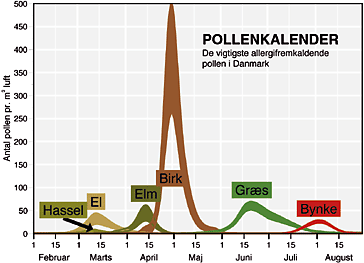 og AAD ()
og AAD ()  you can find a lot of info about pollen.
you can find a lot of info about pollen.At DMI (Danish Meteorological Institute)  og AAD ()
og AAD ()  you can find a lot of info about pollen.
you can find a lot of info about pollen.
Pollen from plants are collected continouesly in Lyngby (on the roof of DMI) and in Viborg (at the regional hospital). Spores from a couple of fungi are also collected at DMI. Once daily - usually around 12 am - pollen collected during the last 24 hours are taken out. The pollen are counted at AAD through a quite complicated prceedure. The result is published daily by DMI and AAD at around 4 pm.
Quite many plants have preferred the wind to take care of their pollination to bees and other insects. It is a characteristic for these plant's pollen what they are very small (about 2.5 to 250 micrometer; 10-6; 1/1,000,000 meter) and are produced in very large quantities. The spreading viries considerably between the individual species from under 1 kilometer to several hundred kilometers. The pollen from birch are believed under certain circumstances to be able to travel up to 3,000 kilometer.
Pollen from 6 plants in particular have the disadvantage that they can be allergenic to many humans.
The 6 plants, that mainly causes pollenallergy in Denmark are:
|

| |||||||||||||||||||||||||||||||||||||||||||||||||||||||||||||||||||||||
Ragweed is quite seldom in Danmark. It is a socalled "Invasive specie" and Naturstyrelsen (Danish Nature Agency)  recommends that it when found is exterminated (put into the dust bin). It is more allergenic than mugwort and has a longer season.
recommends that it when found is exterminated (put into the dust bin). It is more allergenic than mugwort and has a longer season.
Quite a number of mould fungi can be found both out- and in-doors, where they break down plants etc. They prefer / need high humidity to thrive. Their spores can cause allergy. Two of them are Altenaria and Cladosporium. Their level of spores is shown daily as part of the pollencount for Copenhagen (KÝbenhavn).
The description "dasmp-stained" is often related to Altenaria.
The most frequent fungi within the group called "mould".
Advice 1: Stay indoors around noon that is the time of the day with most pollenaround. Keep windows closed.
Ventilate morning and evening when fewest pollen are around.
Advice 2: Dry your laundry in a XXXXXXXXXXXXXXX in the pollen season..
If you dry your textiles out-doors, you risk that pollen will stick to it - and still be there after storage in your cupboard.
Advice 3: Wash or rinse your hair before you go to bed - in particular if you have long hair.
Pollen will attach to your hair and skin. If you take a bath or rinse otherwise, You will not get any pollen into your bed.
Advice 4: Reduce pollen in your eyes be wearing sunglasses or other protecting glasses - mainly if you are outdoors in the middle of the day.
Glasses that fits tightly should be preferred as they protect your eyes from pollen hitting them.
Advice 5: Do not go for outdoor sports in the middle of the day whilst the pollen are most numerous. Do it early morning or evening.
If you breathe through your nose it will filter the pollen. If you are not medicined correctly and your nose fills up you will start breathing through your mouth - and it does not filter the pollen. This can give symptoms similar to asthma.
Advice 6: Remember your medicine. Seek advice from your doctor on what helps best on your symptoms.